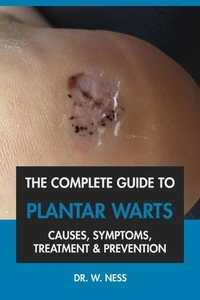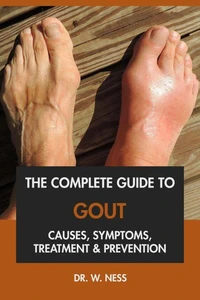The Complete Guide to Psoriasis: Causes, Symptoms, Treatment & Prevention
Par :Formats :
Disponible dans votre compte client Decitre ou Furet du Nord dès validation de votre commande. Le format ePub est :
- Compatible avec une lecture sur My Vivlio (smartphone, tablette, ordinateur)
- Compatible avec une lecture sur liseuses Vivlio
- Pour les liseuses autres que Vivlio, vous devez utiliser le logiciel Adobe Digital Edition. Non compatible avec la lecture sur les liseuses Kindle, Remarkable et Sony
 , qui est-ce ?
, qui est-ce ?Notre partenaire de plateforme de lecture numérique où vous retrouverez l'ensemble de vos ebooks gratuitement
Pour en savoir plus sur nos ebooks, consultez notre aide en ligne ici
- FormatePub
- ISBN8230708544
- EAN9798230708544
- Date de parution14/11/2024
- Protection num.pas de protection
- Infos supplémentairesepub
- ÉditeurIndependently Published
Résumé
Psoriasis is a chronic, autoimmune skin condition that affects millions of people worldwide. It is characterized by red, scaly patches that can appear anywhere on the body, but are most commonly found on the elbows, knees, and scalp. Despite its prevalence, psoriasis is often misunderstood, leading to stigma and isolation for those who live with it. This collection of articles aims to provide a comprehensive understanding of psoriasis, including its types, causes, symptoms, treatment options, and impact on daily life.
The journey of managing psoriasis can be challenging. Many individuals feel overwhelmed by the physical and emotional burden it brings. This collection serves to educate patients, families, and caregivers about the condition, fostering empathy and understanding. By shedding light on psoriasis, we hope to empower individuals to seek appropriate care, engage in discussions about their health, and ultimately improve their quality of life.
As we navigate through these articles, we will explore various aspects of psoriasis, beginning with a fundamental overview of the condition. We will delve into the types of psoriasis, distinguishing their characteristics and manifestations. Understanding the underlying causes and triggers is crucial for effective management. We will also discuss the symptoms and how they can impact daily activities, as well as the importance of timely diagnosis.
Furthermore, we will explore various treatment options, both conventional and alternative, to equip readers with knowledge on managing their condition effectively. A significant part of managing psoriasis involves adopting suitable skin care regimens, and we will provide insights into this aspect. Nutrition plays a vital role in overall health, and we will examine how diet can influence psoriasis symptoms.
The emotional and psychological aspects of living with psoriasis cannot be overlooked. Stress management and mental health are essential components of care, and we will offer strategies for coping with the emotional challenges of the disease. Additionally, we will discuss the importance of support systems and community resources in navigating life with psoriasis. As research continues to advance in the field of dermatology, new treatments and therapies are being developed.
We will highlight recent innovations and future directions in psoriasis care. By the end of this collection, readers will have a well-rounded understanding of psoriasis, enabling them to advocate for their health and well-being.
The journey of managing psoriasis can be challenging. Many individuals feel overwhelmed by the physical and emotional burden it brings. This collection serves to educate patients, families, and caregivers about the condition, fostering empathy and understanding. By shedding light on psoriasis, we hope to empower individuals to seek appropriate care, engage in discussions about their health, and ultimately improve their quality of life.
As we navigate through these articles, we will explore various aspects of psoriasis, beginning with a fundamental overview of the condition. We will delve into the types of psoriasis, distinguishing their characteristics and manifestations. Understanding the underlying causes and triggers is crucial for effective management. We will also discuss the symptoms and how they can impact daily activities, as well as the importance of timely diagnosis.
Furthermore, we will explore various treatment options, both conventional and alternative, to equip readers with knowledge on managing their condition effectively. A significant part of managing psoriasis involves adopting suitable skin care regimens, and we will provide insights into this aspect. Nutrition plays a vital role in overall health, and we will examine how diet can influence psoriasis symptoms.
The emotional and psychological aspects of living with psoriasis cannot be overlooked. Stress management and mental health are essential components of care, and we will offer strategies for coping with the emotional challenges of the disease. Additionally, we will discuss the importance of support systems and community resources in navigating life with psoriasis. As research continues to advance in the field of dermatology, new treatments and therapies are being developed.
We will highlight recent innovations and future directions in psoriasis care. By the end of this collection, readers will have a well-rounded understanding of psoriasis, enabling them to advocate for their health and well-being.
Psoriasis is a chronic, autoimmune skin condition that affects millions of people worldwide. It is characterized by red, scaly patches that can appear anywhere on the body, but are most commonly found on the elbows, knees, and scalp. Despite its prevalence, psoriasis is often misunderstood, leading to stigma and isolation for those who live with it. This collection of articles aims to provide a comprehensive understanding of psoriasis, including its types, causes, symptoms, treatment options, and impact on daily life.
The journey of managing psoriasis can be challenging. Many individuals feel overwhelmed by the physical and emotional burden it brings. This collection serves to educate patients, families, and caregivers about the condition, fostering empathy and understanding. By shedding light on psoriasis, we hope to empower individuals to seek appropriate care, engage in discussions about their health, and ultimately improve their quality of life.
As we navigate through these articles, we will explore various aspects of psoriasis, beginning with a fundamental overview of the condition. We will delve into the types of psoriasis, distinguishing their characteristics and manifestations. Understanding the underlying causes and triggers is crucial for effective management. We will also discuss the symptoms and how they can impact daily activities, as well as the importance of timely diagnosis.
Furthermore, we will explore various treatment options, both conventional and alternative, to equip readers with knowledge on managing their condition effectively. A significant part of managing psoriasis involves adopting suitable skin care regimens, and we will provide insights into this aspect. Nutrition plays a vital role in overall health, and we will examine how diet can influence psoriasis symptoms.
The emotional and psychological aspects of living with psoriasis cannot be overlooked. Stress management and mental health are essential components of care, and we will offer strategies for coping with the emotional challenges of the disease. Additionally, we will discuss the importance of support systems and community resources in navigating life with psoriasis. As research continues to advance in the field of dermatology, new treatments and therapies are being developed.
We will highlight recent innovations and future directions in psoriasis care. By the end of this collection, readers will have a well-rounded understanding of psoriasis, enabling them to advocate for their health and well-being.
The journey of managing psoriasis can be challenging. Many individuals feel overwhelmed by the physical and emotional burden it brings. This collection serves to educate patients, families, and caregivers about the condition, fostering empathy and understanding. By shedding light on psoriasis, we hope to empower individuals to seek appropriate care, engage in discussions about their health, and ultimately improve their quality of life.
As we navigate through these articles, we will explore various aspects of psoriasis, beginning with a fundamental overview of the condition. We will delve into the types of psoriasis, distinguishing their characteristics and manifestations. Understanding the underlying causes and triggers is crucial for effective management. We will also discuss the symptoms and how they can impact daily activities, as well as the importance of timely diagnosis.
Furthermore, we will explore various treatment options, both conventional and alternative, to equip readers with knowledge on managing their condition effectively. A significant part of managing psoriasis involves adopting suitable skin care regimens, and we will provide insights into this aspect. Nutrition plays a vital role in overall health, and we will examine how diet can influence psoriasis symptoms.
The emotional and psychological aspects of living with psoriasis cannot be overlooked. Stress management and mental health are essential components of care, and we will offer strategies for coping with the emotional challenges of the disease. Additionally, we will discuss the importance of support systems and community resources in navigating life with psoriasis. As research continues to advance in the field of dermatology, new treatments and therapies are being developed.
We will highlight recent innovations and future directions in psoriasis care. By the end of this collection, readers will have a well-rounded understanding of psoriasis, enabling them to advocate for their health and well-being.






















